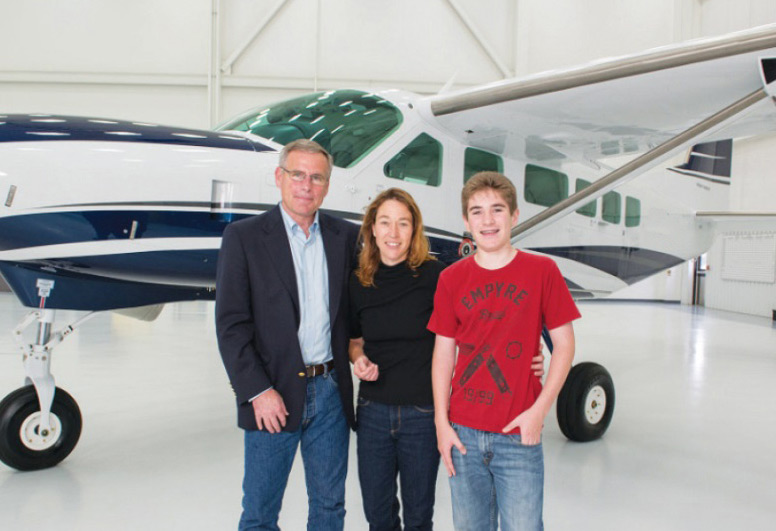Island Air provides critical service for residents
Today, a new hospital on San Juan Island, just off Washington state’s mainland, means babies are more likely to be born in a doctor’s care than at home, in the back of an airplane or on the tarmac. It was a different case eight years ago when Jackie Hamilton added air ambulance services to her charter operation, Island Air.
Based in Friday Harbor, San Juan Island, the company operates several Cessna® aircraft, flying residents and their families, tourists, workers and business executives to and from mainland U.S. and Canada, and between the islands. For years, Hamilton received requests to shuttle women in labor to mainland hospitals.
Where Island Air flies guests
-

To and from mainland United States
-

Between the San Juan Islands
-

To and from mainland Canada
“We used to fly women all the time in the middle of the night to get them to a hospital on the mainland. We had a baby born in the aircraft. We had a baby born in the ambulance next to the aircraft. There have been lots of those stories over the years.”
Jackie Hamilton, owner of Island Air

The San Juan Islands include four main islands and more than 150 smaller, named islands. Without bridges, travel between the islands, as well as the mainland, is only possible by water or air.
The San Juan Islands make up an archipelago in the northwest corner of the United States. No roads or bridges connect the islands to each other or the mainland, but ferries periodically serve the four largest islands.
Still, emergencies and medical transfers rarely happen around ferry schedules. Hamilton decided to integrate true air ambulance service into her charter business, ensuring residents can get to medical care quickly.
“We can service outlying islands as well. Sometimes we bring patients from an outer island to our new hospital on San Juan Island, but mostly we transfer patients from one of the islands to various mainland hospitals. Our medical crew stays with the patient all the way to the hospital,” said Hamilton.
Of its six aircraft, Island Air outfitted two aircraft — a Cessna Skywagon and a brand-new Cessna Caravan® — with medical equipment. Both planes feature a variety of modifications, including two custom-made and specially certified stretcher systems.
The Caravan features a full air ambulance interior, including additional lighting for nurses, a tracking system on the ceiling to hang IV pumps, a LIFEPAK 12 monitor and defibrillator, and other equipment.
“We also installed a wiring harness and equipment for offshore power, a curtain between the pilot and the back cabin, a LifePort stretcher system and additional LED rheostat lighting,” said Hamilton.
One of the Caravan’s best features as an air ambulance isn’t in the cabin — it’s the aircraft’s performance in the region’s adverse weather conditions, according to Hamilton.
“We get fog, a lot of rain, a lot of reduced visibilities, as well as freezing temperatures in the wintertime,” Hamilton said. “Our check airman did a vulnerability study on the weather for our air ambulance service. He asked the question, ‘If we need to get to the mainland hospital in January or February within the hour, what’s the likelihood that can happen?’ I think there was a 40 percent chance that it would not happen. That’s a big vulnerability, and we just felt like we needed to do better, so we did. That’s one of the big reasons we chose the Caravan,” said Hamilton.

Jackie Hamilton took delivery of Island Air’s new Cessna Caravan in June 2014. She was joined by her husband Will and their 15-year-old son Cole.
When it comes to the weather, the fixed-wing aircraft have a distinct advantage over helicopters.
“There is a helicopter based about 26 miles away at a hospital. But, if the weather is low enough, and they can’t get in on their instrument approach, they’re stuck. Most of the time, the conditions are still good enough that we can load up and get the patient out to the hospital,” Hamilton said.
Island Air averages about 300 air ambulance calls a year, just under one a day. With the growing community, the number of calls could rise. The new Cessna Caravan helps Island Air expand its critical air ambulance service and provides additional capabilities for the future.
“The Caravan is a joy to fly. The medical crew is so excited to have the room for gear and full access to the patient."
Jackie Hamilton, owner of Island Air
“Being here makes a difference. We saw the need for it early on. We’ve had some form of an air ambulance service since the 1940s with the founder of the airport, Roy Franklin. He was a friend of mine. I like to think that I’m kind of carrying the baton,” said Hamilton.
Island air averages
300 air ambulance calls
per year
Videos and stories contained in this site may contain information that while accurate at the time of publication, has since been updated. Please connect with a representative for any questions.